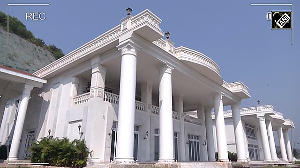Hospitality players want the government to accord infrastructure status to hotels to make investments on new properties more attractive rather than categorising them as luxury or even 'sin goods' in the upcoming Union Budget considering the sector's potential to play a key role in India's growth.

They also want the government to consider incentives in the form of tax breaks or subsidies for adopting sustainable and eco-friendly practices, while asserting that the upcoming budget must accelerate the tourism agenda saying it is an opportunity to make Indian hospitality the emerging engine for GDP growth and employment generation.
"The sector is burdened with high taxation, expensive and multifarious licences, approvals and compliances.
Hotels are capital intensive with a long gestation period. Cost of operating hotels is high and largely fixed.
"This makes investments in hotels risky.
"There is a need to make hotel investments more attractive with an improved rate of investment and to promote ease of doing business," Hotel Association of India (HAI) President KB Kachru told PTI.
He further said the forthcoming Union Budget "offers an opportunity to unleash the potential of India hospitality in its contribution to India Vision 2047 by making key policy shifts in viewing the sector for this potential rather than categorising hotels as luxury, elite or even 'sin' goods".
Kachru said HAI's key policy recommendation for the budget is that the Centre accord the status of infrastructure to hotels.
"This will allow them access to softer finances at better interest rates with longer periods for re-payment thereby attracting investment," he added.
Expressing similar views, Indian Hotels Company Ltd Managing Director and CEO Puneet Chhatwal said, "According the sector infrastructure status will provide a favourable impetus for promoting investment enabling the sector to play a pivotal role in India becoming the third largest economy by 2027."
Chhatwal, who is also the Chairman of CII National Committee of Tourism and Hospitality, and Federation of Associations in Indian Tourism & Hospitality (FAITH) further said the sector creates about 10 per cent of total employment in the country and has been among the key growth sectors for the economy.
"To unlock India's hospitality sector, which remains underserved when compared to the major lodging markets globally, the upcoming budget must accelerate the tourism agenda," he asserted.
Chalet Hotels Ltd managing director and CEO Sanjay Sethi said besides being employment intensive, the hospitality sector is also capital intensive and requires substantial investments.
"Our long-standing demand for infrastructure status and industry benefits at the state level will only provide significant thrust to companies to keep reinvesting for the growth of the industry," he added.
Advantages such as lower utility tariffs, reduced property taxes, easier access to finance and softer loans are crucial for reducing the cost of doing business, ensuring the long-term viability of the sector and in turn, more investments in the sector will bolster job creation, Sethi said.
Royal Orchid Hotels Chief Finance Officer Amit Jaiswal reiterated that the hospitality sector has high expectations from the upcoming Budget, particularly on how it can support the sector as it has been significantly impacted by recent economic fluctuations, and a robust support framework is crucial for recovery and growth.
"Incentives for adopting sustainable and eco-friendly practices would be highly beneficial.
"These incentives could include tax breaks or subsidies for investments in renewable energy, waste management, and water conservation technologies, which are critical as we aim to make our operations more environmentally sustainable," he said.
Jaiswal also said the sector anticipates favourable tax reforms and highlighted that "India imposes one of the highest GST rates on tourism compared to countries like Thailand, Vietnam, Sri Lanka, and even European nations".
Enhanced support for skill development and training programmes to bridge the talent gap and improve service quality in the sector is also needed, he said, adding tourism is one of the highest employment-generating sectors and therefore requires a focused approach from the government.
The sector also hopes to see increased investment in infrastructure development, including better connectivity to key tourist destinations through more airports and improved road networks, which can significantly boost domestic and international tourism, Jaiswal added.











 © 2025
© 2025